Here’s a neat little mystery machine! If cars could talk, I wonder what story this Henry J would tell—and whether it would back up the claim that it was one of three factory convertible prototypes. That’s the story being offered for sale along with the car, which is described as 50% restored, for $9,800. You can check it out on Hemmings, or in Naples, Florida, if you happen to be nearby. Thanks to reader CrazyGeorge for this find!
The Hemmings ad describes this little droptop runabout as a ’53; a little light online sleuthing turned up this site, which has pictures of this self-same car in various states of dress and undress over the years, and which claims that the convertible was a prototype for a 1955 model. Both stories align in describing the car as being in the care of a longtime owner, and both claim that this is the first, and sole survivor, of three prototypes. I’m a little skeptical that Kaiser had plans to continue Henry J production that long, as it had never caught on and, more importantly, never made money. Still, even if this was built as a “1955,” it’s not surprising that it would have a 1953 serial number; the few ’54s that were built were simply leftover ’53s, so that was effectively the model’s last year.
Whatever its provenance, this is a project car in the here and now. The seller asserts that all of the parts needed to finish the car are present and will be included in the sale. Moreover, the car is claimed to run, although that little Willys four up there looks like it’s missing some important accoutrements, like a radiator for starters. The optional six seems like the more sporting choice for an open car, but if this truly was a factory prototype, perhaps it was more about show than go—and better to start with a basic car than to lose more money sacrificing an all-important sale of a more expensive model.
A factory heater and radio are said to be included, although neither appear to be installed. I’m curious as to whether this car ever had a convertible top and, if so, whether that’s included as well. Speaking of exposure, I’m a little concerned about how long this topless car has been sitting outside along the Gulf Coast; certainly quite a bit of bodywork appears to have been done in the past, and while nothing seems overtly amiss, I’d hate for it to have been wasted effort.
A factory Continental kit is also said to be included. I’m already on record as not being a big fan of these, and when you see what this pert little rump could look like—with a standard Henry J sedan handy for reference—well, why would you want to obscure that? Either way, and factory prototype or no, there’s no denying that this could be a cute little convertible, not to mention a bit jazzier than your run-of-the-mill Henry J. Any of our loyal readers feel the itch to complete this restoration? If you do, please come back here and tell us the car’s true story!
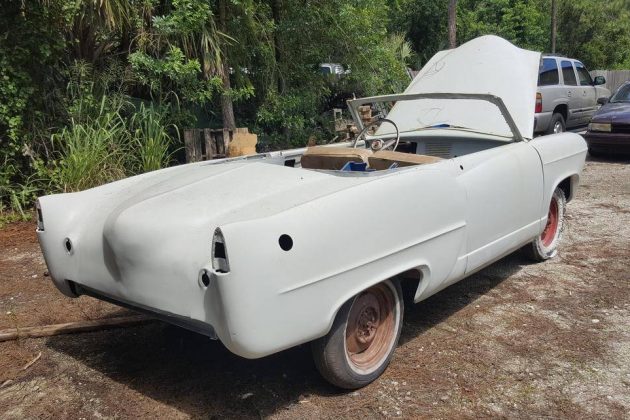
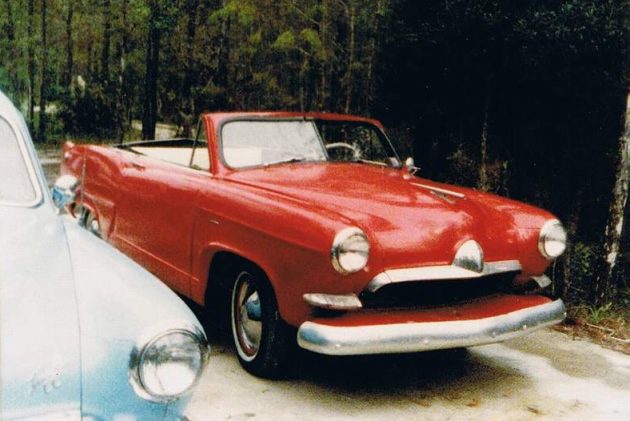
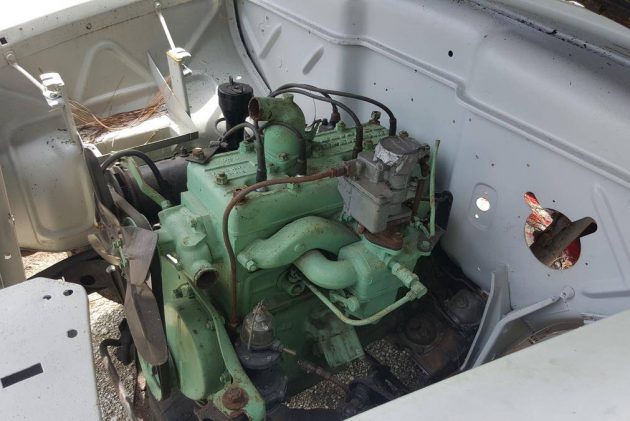
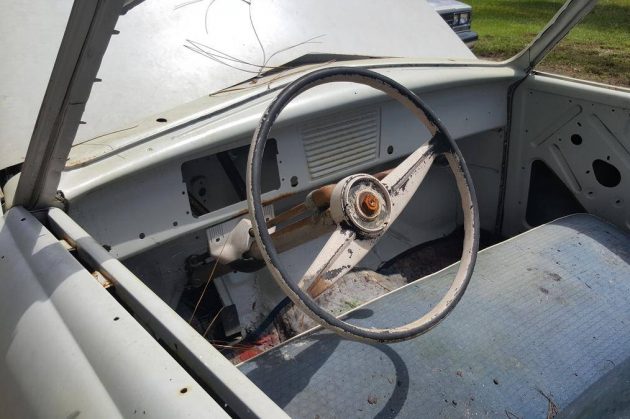
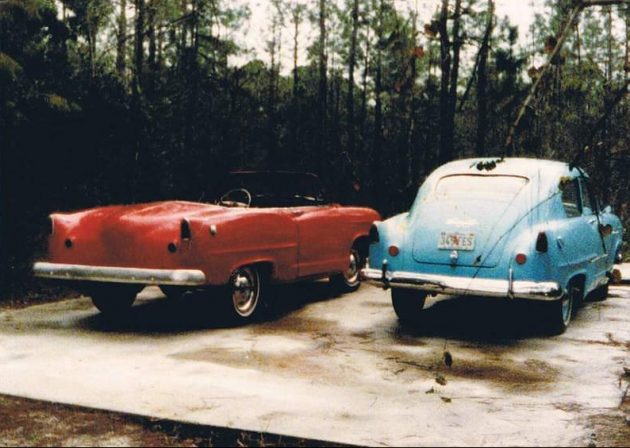



The rear panel looks suspiciously like a hood turned around backwards and grafted on. Does this thing even have a top? I am skeptical that it was a factory job. Neat, nevertheless I would drive it.
Love the looks of these cars, here’s one from our yearly KCI airport car show held every September.
My name is RAYMOND F. PITTAM. Originally from St. Joseph, Missouri. I bought my wife back then a 1953 Henry J Kaiser. It had the small Willy’s jeep engine in it with three on the dash if I remember right. I also had a Nash Bath Tub Rambler six cylinder with the Dash Shift.
We traveled old Highway 71 to and from Kansas City many many times. I have to say we liked our Henry J, much better because of the great gas mileage as well as comfort and being easy to park. I also have to say The Henry J. gave you the feeling you were traveling on some what of a bubble because of it’s great openness. It’s top cruising speed was right att 55 and 60 M. P. H. and we was never late to any appointments.
These things look positively nekkid without the optional Hemi, M&H slicks, full cage, wheelie bars and chute. Check those boxes on the option sheet, and that’s the real “sporting choice”.
If it can’t convert, it ain’t a convertible . . ..
John D. I own and drive two 1901 Oldsmobile’s, They never had a roof, I added a canopy for heat and rain purposes. I drove one from California to Missouri and back I had rain hail, thunder, wind, heat and even ice in the mountains. Now it has a solid Fixed Surrey Canopy. May I ask you, Is it a Convertible or is it something else/ Just type my name on any computer or Cell phone and I will be there. Please let me know how I should register the Next Car Show I attend and or Sponsor. I am 78 years young, and have owned many Convertibles. What is my 1901 Oldsmobile/ I really want to know. http://www.MtShastaOphanClassicsGroup.shutterfly.com and Facebook.com
As a prototype, wouldn’t they have put a trunk in?
From what I read, this is a copy of the original the builder saw at an auto show in 1952. It claims, the original was destroyed. Somebody did a lot of work here. Even though, early Henry J’s had no trunk lid, someone still had to shape that. Is it really worth all that for a car that never existed?
I saw that story floating around, too, although I believe it was in reference to this car: https://www.mecum.com/lots/IA0710-96075/1952-kaiser-henry-j-convertible/
Custom-built Henry J convertibles are not too uncommon, but the possibility of factory-built prototypes is murky at best. There’s an interesting discussion about Henry J convertibles in this thread: https://www.jalopyjournal.com/forum/threads/henry-j-convertible.416203/
I no longer have my copy of Richard Langworth’s K-F book (doggone it!) but am pretty sure he said the factory built NO Henry J convertibles. He published a photo of one built by a K-F dealer, and this isn’t it.
I would be a little dubious about driving it unless there were some serious structural reinforcements added, and I see no signs of those.
K-F built quite a few one-offs, mainly for company management and celebrities. Spent a lot of money doing so, too. But no Henry J convertibles. And every one I’ve seen detailed was pretty heavily optioned. I’m sure this, if truly a K-F car, would have had the six-cylinder engine, if not the six with an automatic transmission.
Hans penned it right. Now we have a nosed-tail speedster.
Body gusseting only would be required. As the frames were very stout for a car this small and light. I know, I moved one around for years. (moving from one house to another)
Back in the late 60’s, I found one like this in a junk yard in central WI, big difference was that it had an early Olds V8/2bbl/Hydramatic in it. It looked well made and it looked like the trunk was a ’49-’51 Ford hood. Everything on it was stock, so it didn’t appear to be a homebuilt hot rod. I passed because I already had way too many projects (the story of my life).
Some months later, I passed that info on to an acquaintance that was well versed in Kaiser/Frazer & Hudson, and I thought he was going to wet his pants.
He was positive the K-F had built a couple of prototypes using an Olds V8, at least one coupe and one floptop, and the conv. used a Ford hood as a trunk.
He was going to look at it the next weekend, but I never saw him again. The next time I was at the same yard, a couple of months later, it was gone.
That’s all I know, could be true, could be an urban legend, but it sure was a neat looking car.
my father had the grave misfortune of getting stuck with 6 henry js to clear a debt owed to him{ he had a garage and sold used cars on the side] these piles of junk almost drove him to drinking! he sat on them for a year , nobody wanted them as they were a gutless ugly cheap excuse of a car! I got the job of cutting them up for scrap to get rid of them,
Hi Jerry, they were a lackluster car, including the ill-fated attempt to badge engineer the Henry J as an Allstate, sold by Sears. No trunk lid ( standard) no sun visors, glove box or wing windows, it was suppose to be a basic car. Like many cars, I think it was just the wrong time for a no-frills car. People were getting fancier cars in the early 50’s, not cheapies. Later on in the decade, cheapies came back, like the Studebaker Scotsman, some Ramblers were pretty plain and of course the ultimate no-frills car, the VW bug. The mechanical parts of the Henry J were well proven, but not for the changing times.
A family friend had a brochure from the late fifties or early sixties on building these at home and they did use a hood for the trunk. I’ll see if I can find it.